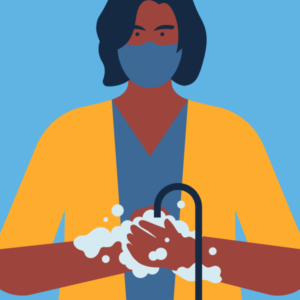 A worsening of Obsessive-Compulsive Disorder (OCD) was found to be a high as 65% according to a November 2021 meta-analysis of 21 studies published in Neuroscience & Behavioral Reviews.
A worsening of Obsessive-Compulsive Disorder (OCD) was found to be a high as 65% according to a November 2021 meta-analysis of 21 studies published in Neuroscience & Behavioral Reviews.
Germs, illness, and contamination– the pandemic in many ways reinforced fears by justifying the need to take action to avoid infecting yourself or others. Since obsessions feeds on doubt, the uncertainty and unknows related to COVID has impacted the response of engaging in rituals to help reduce anxiety and prevent contamination for some individuals who are struggling with OCD.
But WHAT IF there is a high probability of contamination?
What if I was exposed to the germs of an “infected” person and contracted a deadly illness or worse yet…spread it to others?
There may be excessive concerns related to “properly” sanitizing, cleaning, and washing to help protect self and others. Returning to “normal” life can be especially challenging. Going to the grocery store in person, returning to the office, using public transportation, flying on an airplane…these experiences may be avoided all-together even where it is determined “safe” to re-engage.
One thing that has been particularly hard for those with OCD is that COVID was the third-leading-cause-of-death in the United States last year. Heart disease and cancer took first and second as the leading causes, which are significant fears for those with Somatic-OCD.
You may take a COVID test multiple times “just to make sure” or check physical symptoms such as temperature and heart rate. You might wash your bedding daily. You may double glove, double-mask, or all-together avoid situations. Touching items that others have touched may create significant distress. Doorknobs is a classic example. Your cleaning routine may be quite time consuming and cause great anxiety if not done in a certain way.
Here are some helpful guidelines specifically for OCD-symptoms that have been impacted by the pandemic.
- Follow basic safety and cleanliness-rules from trusted health and organizations related to disinfecting surfaces, cleaning, and washing hands.
https://www.cdc.gov/handwashing/when-how-handwashing.html
- Talk to someone about what might be a reasonable safety measure to take in situations in which you have urges to engage in behaviors beyond the guidelines. Your therapist or doctor can be especially helpful.
- Consider leaning into the uncertainty of your fears–balancing common sense with the need to do things “perfectly”.
- Remember that since obsessions may not fit your personality or value systems, thoughts such as fear of harming others via contamination either accidentally or on purpose can be intensified by the unhelpful voice of OCD.
- If you have experienced new or increased intrusive thoughts or are engaging in rituals as a measure of relieving distress, consider reaching out for help to find-the-right-therapist.
Written By : Charlotte Johnson, MA, LPCC
We’re Here to help
Our wellness experts will be happy to take care of you. You can CLICK HERE to schedule an appointment now or call (612)223-8898.
Meet Clinicians
We’re united by our commitment to providing effective, relevant, and innovative mental health support at all stages of your journey. Click Here to find out more about who we are, where we come from, and how we live out CARE’s mission every day.
The professionals at CARE are actively collecting and creating resources to help with what you need. We’re Here for You.



